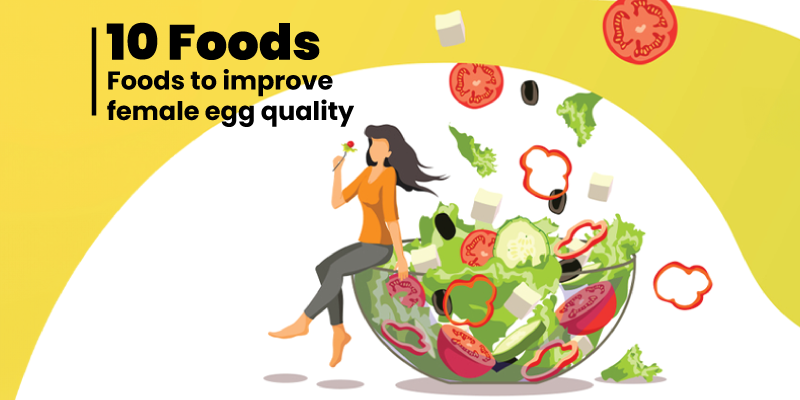The ovum or egg quality is one of the important markers of female fertility. Consistent period cycles and the fertilization process or the ability to conceive depend on the quality of the egg. The term “egg quality” describes whether an egg or ovum is genetically normal or abnormal.
A good quality egg or a genetically normal ovum has 23 chromosomes (euploid). A chromosomally abnormal egg has less or more than 23 chromosomes (aneuploidy), this leads to poor egg quality and the development of genetic conditions when it is fertilized. In this article we will learn about egg quality, which foods can improve and deteriorate it, and which nutrients are best for your age group.
Signs of Good vs. Poor Egg Quality
It is important to understand how your eggs are doing. Here’s a detailed overview indicating if they are healthy or not:
| Signs of Good Egg Quality | Signs of Poor Egg Quality |
| Balanced hormonal levels | Difficulty in getting pregnant or repeated miscarriages |
| Regular menstrual cycles | Absent or delayed periods |
| Noticeable changes in cervical fluid and basal body temperature during the menstrual cycle | Short or altered menstrual cycles |
| Heavy menstrual flow | |
| Hormonal imbalance – low levels of Progesterone and Anti-Müllerian Hormone (AMH) |
How can egg quality be increased?
Even though the number of eggs cannot be increased, it is possible to improve the quality of the eggs for better chances of conception. Here are a few tips that you can follow to improve the quality of eggs when trying to get pregnant or planning for IVF.
1.Maintain a healthy sleep cycle
Proper rest is essential for the body to heal and to function at a full metabolic level while awake. It is recommended to get at least 7 to 8 hours of sleep daily.
2. Stress Management
Hormones like Prolactin and Cortisol are triggered due to stress. These hormones interfere with the ovulation process. Stress-relieving methods such as meditation, yoga, exercise, or any hobby that might help you release the built-up tension can help.
3. Boosting blood flow to the ovaries
Oxygen-rich blood nourishes the ovaries to maintain good egg health. Regular yoga and exercise can help in boosting the blood flow.
4. Freezing eggs
Egg preservation is a good alternative for women who don’t have any pregnancy plans shortly. Preserving eggs by freezing them at low temperatures helps in preserving the egg quality. Egg Freezing is a good option, that women should consider at the young age of 25, as their egg quality is at its peak, and freezing good quality eggs might give a better chance at IVF success when they plan for a baby.
5. Eat healthy
Making healthy food choices not only improves reproductive health but also contributes to improving overall health.
How Does Food Impact Egg Quality?
Nutrition plays an important role when it comes to women’s reproductive health. The food we consume might not have a direct link but a good balanced meal supports in improving the egg quality and reproductive potential in women by maintaining hormone levels and blood circulation.
Nutrients like antioxidants, folate, omega-3 fatty acids, vitamin D, and selenium help eggs mature properly and protect them from damage caused by oxidative stress. Since it takes nearly 90 days for an egg to mature, your food and lifestyle choices during this period directly affect fertility outcomes.
Top 10 foods to improve egg quality
Here are the top foods that you can include in your daily meals to improve egg quality:
1, Beans and lentils:
Proteins help in maintaining blood sugar levels, building and cell repair. Beans and different types of lentils are a rich source of protein, iron, vitamin B complex, folate and magnesium. One cup cooked a few times a week in dal, curries, or salads is very effective.
2. Seeds:
Seeds such as sesame seeds, flax seeds, pumpkin seeds, and sunflower seeds are a combination of both micronutrients and monounsaturated. Seed cycling is a method used to address hormonal imbalance.
3. Nuts and Dry Fruits:
Nuts and dried fruits such as walnuts, almonds, peanuts, cashews, and raisins are good sources of healthy fats, minerals, antioxidants, and vitamins. Nuts such as Brazil nuts are good sources of selenium. Selenium helps to repair chromosomal damage in eggs. The antioxidants in dry fruits help in lowering the oxidation stress in cells.
Walnuts are rich in omega-3 and antioxidants, reduce inflammation and protect egg cells. Have 3–4 pieces daily as a snack or mix into porridge.
4. Avocados:
Avocados are super foods packed with nutrients and healthy fats. Avocados are a great source of monounsaturated fats.
Packed with folate and healthy fats, avocados promote better blood flow to reproductive organs and help balance hormones. Half an avocado daily added to salads or smoothies can support fertility nutrition.
5. Berries:
Berries like strawberries, raspberries, cranberries, and blueberries are antioxidant powerhouses. They are loaded sources of antioxidants, vitamin C, and Folate. The antioxidants present in them protect the eggs from oxidative stress. A small bowl of mixed berries daily with yogurt, dahi or oats is a simple way to include them.
6. Cinnamon:
It is another superfood, especially for women who are suffering with PCOS. Adding cinnamon to your diet helps fight insulin resistance and enhances ovarian function. You can sprinkle a small amount of cinnamon daily in your tea, smoothie or oatmeal.
7. Ginger:
Ginger’s anti-inflammatory property along with improving digestion and blood circulation helps in regulating periods and lowering inflammation in the reproductive system. Use fresh ginger in teas, curries, or soups a few times a week.
8. Green Leafy Vegetables:
Vitamins A, B, C, and E, iron, and calcium are a few vital nutrients that are necessary to maintain the health of eggs. Leafy vegetables such as spinach, broccoli, house these essential nutrients. They are also loaded with folate that prevent deficiencies that affect fertility. Include 1–2 servings daily as a sabzi, soups, or smoothies.
9. Whole Grains:
Whole grains are underrated hidden treasures of fibre and vitamin B. Fibre is a multifunctional nutrient that helps to maintain a healthy body weight by preventing rapid blood sugar spikes and stabilizing blood sugar levels. This helps in improving general health and reproductive health. Swap refined grains for one cup of whole grains at lunch or dinner.
10. Dairy:
Dairy products such as milk and yogurt are a great way to incorporate calcium, protein and probiotics into your diet to strengthen bones, support hormone regulation, and improve gut health. One to two servings of milk, yogurt, dahi or paneer daily is beneficial, unless restricted for medical reasons.
One-Day Meal Plan to Improve Fertility
Here’s a sample meal plan for you that you can follow in a day to improve the quality of eggs:
- Breakfast: Vegetable upma with spinach and carrots, paired with a small bowl of papaya or berries.
- Lunch: Brown rice with dal, palak sabzi (spinach curry), and a side of curd. Add a handful of walnuts as mid-meal.
- Dinner: Quinoa khichdi with moong dal, seasonal vegetables, and a side of sautéed broccoli or beans.
Diet Considerations for Different Age Groups
Here’s a quick checklist to understand which nutrients are essential for you based on your age group:
- If you are over 35: Focus on foods rich in omega-3 and vitamin D, like salmon, eggs, and fortified dairy, as they support egg health at this stage.
- If you have PCOS: Choose low GI carbs (quinoa, brown rice) and high-fiber vegetables. Cinnamon may support blood sugar balance.
- If you follow a vegetarian/vegan diet: Use plant-based omega-3 sources such as chia seeds, flaxseeds, and walnuts along with mushrooms and fortified soy products for vitamin D.
Foods That Can Harm Egg Quality
Now that we know which foods are beneficial for the eggs, let’s understand certain foods that can interfere with fertility and egg health:
- Excess caffeine (over 200 mg per day) may reduce egg quality.
- Alcohol disrupts hormonal balance and egg maturation.
- Trans fats and processed foods (fried snacks, packaged desserts, fast foods) raise inflammation.
- Sugary drinks like sodas can cause insulin imbalance that affects ovulation.
Conclusion
Egg quality is one of the important factors that contribute to the chances of having a pregnancy and the success of the IVF procedure. Improving egg quality takes time and consistency, but the right mix of nutrient-rich foods, healthy lifestyle habits, and medical guidance can make a real difference in fertility outcomes.
For personalised fertility guidance and treatment, connect with Oasis Fertility at 1800-3001-1000 or use the live chat option on our website to speak with an expert.

